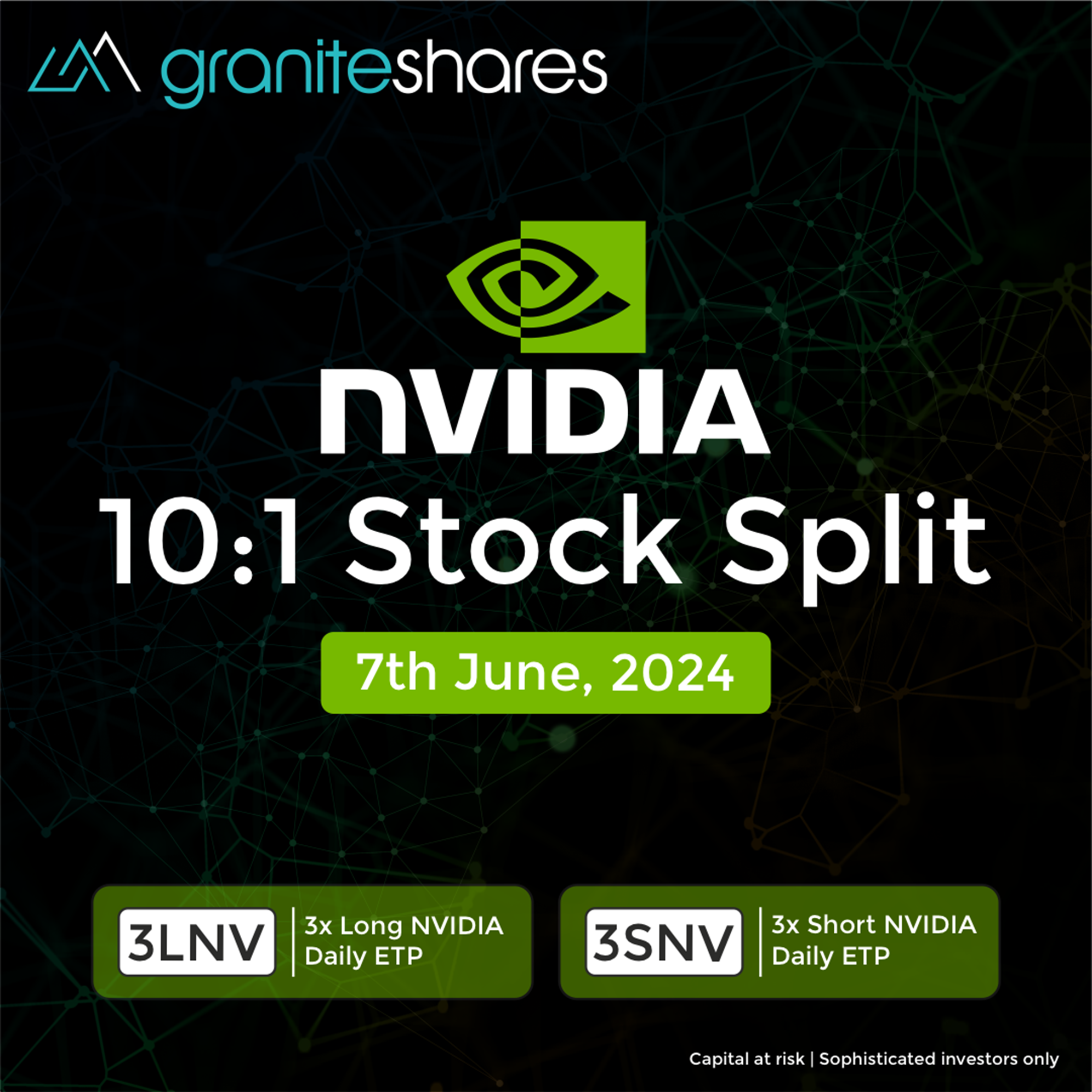What NVIDIA's Stock Split Means for Investors
Posted:
On 22nd May, Nvidia announced a 10-for-1 stock split alongside its impressive earnings report. This move aims to lower the chipmaker's stock price, potentially making it more accessible to employees and investors. This stock split means investors will receive nine additional shares for every share they currently hold.
Nvidia (NVDA) shares have surged over 90% this year and more than 200% in the past 12 months, driven by the pivotal role its semiconductor chips play in training and running artificial intelligence models. The stock now trades above $1,000 per share, up from $495 at the end of 2023. In May 2023, just before reporting impressive earnings that ignited the AI stock frenzy, Nvidia shares were around $305 each.
The company's previous stock split occurred in July 2021, when it issued three new shares for every existing one (a four-for-one split).
How Nvidia's 10-for-1 Split will Impact Investors
Every holder of common stock as of the market close on Thursday, June 6, 2024, will receive nine additional shares, to be distributed following the market close on Friday, June 7, 2024. Trading is anticipated to commence on a split-adjusted basis at the market open on Monday, June 10, 2024.
While the stock split will increase the number of shares available, it won't alter the overall value of the company or Morningstar's assessment of its stock. According to Colello, the split won't generate economic value in theory, but it will enhance accessibility for smaller investors. Currently, $500 may not be sufficient to purchase a single share of Nvidia, but post-split, it could buy several shares.
Understanding Stock Splits - Fundamentals and Implications for Investors
Stock splits are often viewed positively by investors, but it's essential to understand that they don't alter a company's underlying fundamentals.
During a stock split, a company issues additional shares to existing shareholders based on their current holdings. For instance, in a 2-for-1 split, investors receive two shares for each one they own. In Nvidia's upcoming 10-for-1 split, someone with one share of stock would wake up on June 10 with 10 shares.
Despite the increase in shares, the share price is divided accordingly. For example, if you owned a $1,000 share of stock, after a 2-for-1 split, you would have two $500 shares. Similarly, a 10-for-1 split would result in 10 shares for $100 each.
However, crucial metrics such as earnings per share, price-to-earnings ratio, and dividend yield remain unchanged after the split. The day after the split, you wouldn't notice a change in your portfolio other than the share price and number of shares.
Why Do Companies Split Their Stock?
When a company splits its stock, each share is divided into multiple new shares. Although this increases the number of outstanding shares, it doesn't affect the company's overall value (market capitalization). Companies often perform stock splits when their share price has risen significantly, potentially making it difficult for individual investors to afford them. By creating more shares at a lower price, companies aim to attract more buyers, improving liquidity.
Additionally, lower prices can have a psychological impact, making shares appear more attractive to investors, even though the company's intrinsic value remains unchanged.
Another reason some companies might undergo a stock split is to facilitate their addition to an index like the Dow Jones Industrial Average (DJIA). Price-weighted indexes such as the Dow generally avoid high-priced stocks because large price movements in these stocks can disproportionately impact the index.
Bottom Line
Stock splits increase the number of outstanding shares and lower the share price without altering a company's overall value. They can make stocks more accessible to individual investors, improve liquidity, and sometimes facilitate inclusion in major indexes like the DJIA. While stock splits don't change a company's fundamentals, they can attract a broader range of investors and enhance market perception. Investors should focus on the underlying business performance and growth potential rather than the psychological appeal of lower-priced shares.
Sources:
NVIDIA ETPs by GraniteShares
| Product name | Ticker | ||
|---|---|---|---|
| USD | EUR | GBX | |
DISCLAIMER
Please note that GraniteShares' short and leveraged Exchange Traded Products are suitable only for sophisticated investors.
This is a disclaimer stating that all trading and investing comes with risks. Always do your research and do not invest more than you can afford to spend.
GraniteShares accepts no responsibility for any loss or damage resulting directly or indirectly from the use of this blog or the contents.
This blog does not constitute an offer to buy or sell or a solicitation of an offer to buy securities in any company. Nothing contained herein constitutes investment, legal, tax or other advice nor is to be relied upon in making an investment or other decision. No recommendation is made positive or otherwise, regarding individual securities or investments mentioned herein. Any summary list of risk factors does not purport to be a complete enumeration or explanation of the risks involved in a particular investment. Prospective clients must consult with their own legal, tax and financial advisers before deciding to invest. This email contains the opinions of the author and such opinions are subject to change without notice. The source of data is GraniteShares unless otherwise stated. No guarantee is made to the accuracy of the information provided which has been obtained from sources believed to be reliable. This email and the information contained herein is intended only for the use of persons (or entities they represent) to whom it has been provided. Past performance is not a reliable indicator of future results. The value of an investment may go down as well as up and can result in losses, up to and including a total loss of the amount initially invested. Investments may involve numerous risks including, among others, company risks, general market risks, credit risks, foreign exchange risks, interest rate risks, geopolitical risks and liquidity risks. Please note that GraniteShares short and leveraged Exchange Traded Products are for sophisticated investors.


